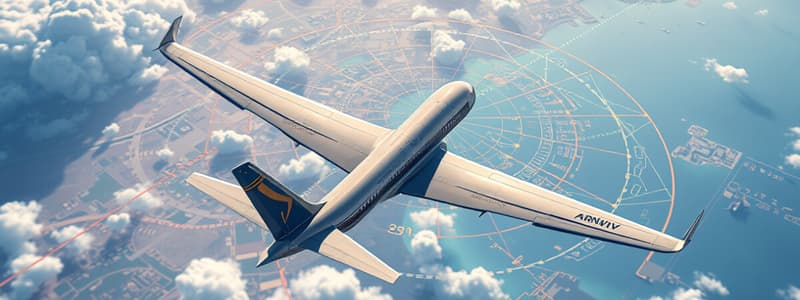Podcast
Questions and Answers
What is the required RNP for RNP 1 (P-RNAV) operations?
What is the required RNP for RNP 1 (P-RNAV) operations?
- 0.5 nm
- 10 nm
- 5 nm
- 1 nm (correct)
In which type of flight areas is RNP 10 mandated?
In which type of flight areas is RNP 10 mandated?
- All airspace types
- Only military airspace
- Urban areas and airports
- Remote and oceanic areas (correct)
What does RVSM airspace allow in terms of vertical separation between approved aircraft?
What does RVSM airspace allow in terms of vertical separation between approved aircraft?
- 1000 ft (correct)
- 1500 ft
- 500 ft
- 2000 ft
Which specific operational requirement is included for RNP 10 airspace?
Which specific operational requirement is included for RNP 10 airspace?
What is the requirement for flight crew training syllabus in RNP operations?
What is the requirement for flight crew training syllabus in RNP operations?
Which of the following is NOT a component of RNP airspace operational requirements?
Which of the following is NOT a component of RNP airspace operational requirements?
Which of the following best describes RNAV procedural airspace?
Which of the following best describes RNAV procedural airspace?
What is the RNP required for operations within certain Terminal Areas?
What is the RNP required for operations within certain Terminal Areas?
What is the main purpose of the intermediate check during flights of less than 60 minutes?
What is the main purpose of the intermediate check during flights of less than 60 minutes?
Which entry must be recorded on the OFP during a flight of less than 60 minutes?
Which entry must be recorded on the OFP during a flight of less than 60 minutes?
If a change in routing occurs during a flight, what must be maintained?
If a change in routing occurs during a flight, what must be maintained?
What should be assessed if the expected fuel remaining at destination is less than the minimum reserves?
What should be assessed if the expected fuel remaining at destination is less than the minimum reserves?
During the intermediate check, which of the following should NOT be recorded?
During the intermediate check, which of the following should NOT be recorded?
What is the expected outcome when performing an intermediate check?
What is the expected outcome when performing an intermediate check?
What constitutes minimum reserves for an aircraft according to the operational guidelines?
What constitutes minimum reserves for an aircraft according to the operational guidelines?
Which aspect is NOT required during fuel evaluation at each check?
Which aspect is NOT required during fuel evaluation at each check?
What must be considered when planning and briefing an approach in accordance with the metric system?
What must be considered when planning and briefing an approach in accordance with the metric system?
When using meters QNH for altitudes, what should a pilot do if automatic metric conversion equipment is unavailable?
When using meters QNH for altitudes, what should a pilot do if automatic metric conversion equipment is unavailable?
What is the primary action taken when a new cleared altitude or flight level is notified by Air Traffic Control?
What is the primary action taken when a new cleared altitude or flight level is notified by Air Traffic Control?
What is a key caution regarding the altitude alerting system when it is integrated with the Autopilot and Flight Director System?
What is a key caution regarding the altitude alerting system when it is integrated with the Autopilot and Flight Director System?
What action should a pilot take when they reach the minimum altitude as indicated in feet during an approach?
What action should a pilot take when they reach the minimum altitude as indicated in feet during an approach?
What documents should be referenced for altitude and height conversions during an approach?
What documents should be referenced for altitude and height conversions during an approach?
Which crew member is responsible for setting the altitude alert when the autopilot is not engaged?
Which crew member is responsible for setting the altitude alert when the autopilot is not engaged?
What do go-around altitudes specified on approach charts use as their unit of measurement?
What do go-around altitudes specified on approach charts use as their unit of measurement?
What should be noted if there is a diversion from the planned route?
What should be noted if there is a diversion from the planned route?
What is the minimum requirement for visibility before a take-off can commence?
What is the minimum requirement for visibility before a take-off can commence?
What must be monitored while en-route according to the regulations?
What must be monitored while en-route according to the regulations?
What happens if a flight is operating slightly off the route indicated on the Operational Flight Plan?
What happens if a flight is operating slightly off the route indicated on the Operational Flight Plan?
What condition must be met for a flight to continue towards its destination during in-flight re-planning?
What condition must be met for a flight to continue towards its destination during in-flight re-planning?
Which of the following is NOT a required action before take-off?
Which of the following is NOT a required action before take-off?
During the completion of navigation logs, when can it be deemed acceptable to skip updates?
During the completion of navigation logs, when can it be deemed acceptable to skip updates?
What should be kept updated in navigation logs during the flight?
What should be kept updated in navigation logs during the flight?
What is the minimum amount of usable fuel required at the Predetermined Point (PDP) to proceed to the destination aerodrome?
What is the minimum amount of usable fuel required at the Predetermined Point (PDP) to proceed to the destination aerodrome?
What action should a Commander take if the fuel remaining when approaching the PDP is below the required minimum?
What action should a Commander take if the fuel remaining when approaching the PDP is below the required minimum?
Which of the following is NOT a condition for continuing to the destination aerodrome when approaching the PDP with low fuel?
Which of the following is NOT a condition for continuing to the destination aerodrome when approaching the PDP with low fuel?
What is the primary fuel concern for a Commander during low fuel state procedures?
What is the primary fuel concern for a Commander during low fuel state procedures?
What should a Commander do if unanticipated circumstances may lead to landing with insufficient fuel?
What should a Commander do if unanticipated circumstances may lead to landing with insufficient fuel?
What is stated about the operations to Isolated Aerodromes for AEROTRANSCARGO?
What is stated about the operations to Isolated Aerodromes for AEROTRANSCARGO?
What must a Commander consider when calculating the total fuel needed at the PDP?
What must a Commander consider when calculating the total fuel needed at the PDP?
When flying to the destination aerodrome, what does the contingency fuel ensure?
When flying to the destination aerodrome, what does the contingency fuel ensure?
Flashcards are hidden until you start studying
Study Notes
RNAV Approaches and Navigation Logs
- Navigation logs must be carefully filled during flight, excluding busy terminal environments.
- Update Estimated Times of Arrival (ETAs) with any significant route changes, documenting the reason and timing.
- Deviations from the Operational Flight Plan (OFP) can invalidate Minimum Off-Route Altitudes (MORAs), requiring extra caution during climbs and descents.
Weather Conditions for Flight Decisions
- Commanders must ensure weather conditions and runway status are safe for take-off, including verifying Runway Visual Range (RVR) against required minima.
- In-flight, weather at the destination and alternates must be continuously monitored; continuation is conditional upon weather meeting minima at the ETA.
- Flight re-planning is mandatory if expected weather at destination or alternates falls below required minima.
RNP Airspace Operations
- RNP 1 (P-RNAV) operations are required in designated terminal areas, demanding an accuracy of 1 nautical mile (nm).
- RNP 10 operations are mandated for specific remote and oceanic routes with an accuracy of 10 nm.
- Operational procedures, including equipment requirements for both RNP 1 and RNP 10, are outlined in the Operations Manual.
RNAV Procedure Characteristics
- RNAV procedural airspace includes designated areas for departures, arrivals, and approaches; some may have specific Required Navigation Performance (RNP) standards.
- RVSM airspace implements a 1000 ft vertical separation between aircraft compared to an ICAO standard of 2000 ft, applicable from FL290 to FL410.
Altitude Alerting System Procedures
- Reset altitude alerting systems whenever an altitude change is directed by ATC or initiated by flight crews.
- For short flights (less than 60 minutes), an intermediate fuel check is recommended; only RVSM checks need to be documented during flight.
- Fuel checks should include comparisons between actual consumption and planned, ensuring sufficient reserves for landing.
Flight Planning with Predetermined Points (PDP)
- At a Predetermined Point, usable fuel must cover the trip fuel, contingency fuel, and two hours of cruise above the destination.
- If fuel is insufficient at the PDP, the Commander may either divert to an alternate or continue if two runways are available and weather is compliant.
Low Fuel State Management
- Commanders must maintain usable fuel above the minimum required for safe landing, including reserves.
- When faced with unexpected delays, Commanders should seek landing information from ATC to avoid landing with less than final reserve fuel plus alternate aerodrome fuel requirements.
Studying That Suits You
Use AI to generate personalized quizzes and flashcards to suit your learning preferences.




